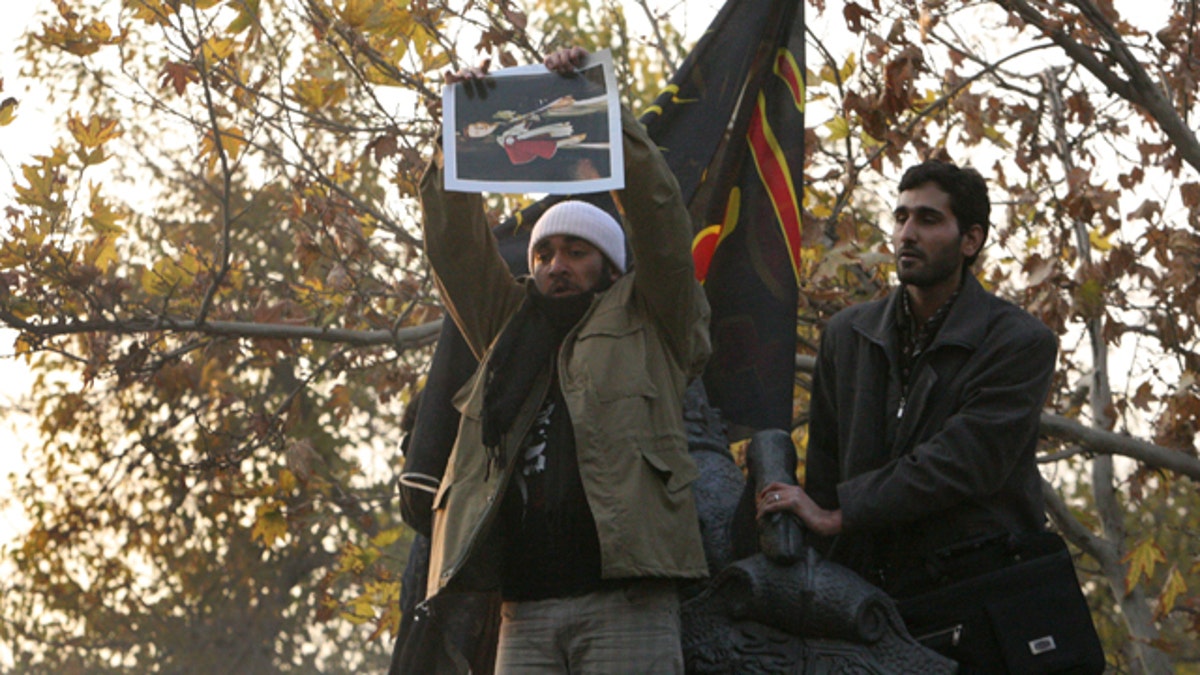
Nov. 29: An Iranian protester holds a picture of Queen Elizabeth to tear up on the gate of the British embassy in Tehran. (AP)
TEHRAN, Iran – Iran on Thursday banned foreign media from covering any rallies in front of British diplomatic missions in the capital, in the latest fallout from the storming of Britain's embassy in Tehran by pro-government demonstrators.
The attack on the compounds on Tuesday was preceded by an apparently state-approved rally outside the British Embassy to denounce Britain's support for the latest round of Western sanctions on Iran over its disputed nuclear program.
"We inform all representatives of the foreign media that their presence at rallies in the city, especially in front of the British Embassy and Gholhak garden, or residential compound, is not permitted unless authorized in advance," Iran's foreign media office said in a statement.
After mass anti-government demonstrations in 2009, Iran banned against foreign media from covering opposition protests, but this is the first time Tehran has barred foreign media from covering pro-government rallies.
Tuesday's rampage at the British compound went on for hours, with the mob hauling down Union Jack flags, torching a vehicle and tossing looted documents through windows.
Protesters replaced the British flags with Iran's flag and a banner in the name of a 7th-century Shiite saint, Imam Hussein, and one looter showed off a picture of Queen Elizabeth II apparently taken off a wall.
The incident has deepened Iran's isolation and significantly escalated tensions with the West. It prompted Britain to pull its diplomats out of Iran, shutter the ransacked embassy and order all Iranian diplomats out of the U.K. within 48 hours. Germany, France and the Netherlands have recalled their ambassadors in solidarity.
Italy and Spain both summoned Iranian envoys to condemn the storming of the British embassy.
On Thursday, Iran allowed diplomats from 16 EU nations and eight other countries, including Russia, Brazil and Turkey, to visit the ransacked British diplomatic buildings. A Western diplomat who took part in the trip told The Associated Press the visit aimed to make a quick assessment of the damage to the site. He did not elaborate.
Also, Norway reopened its embassy in Tehran after a 24-hour closure due to security concerns following the attack.
Late Wednesday, Iranian authorities released 11 hardline protesters detained for the attack on the British diplomatic buildings, the semiofficial Fars news agency reported Thursday. There was no immediate explanation for the release.
Under Iranian law, damaging property carries a prison term of up to three years. It could, however, indicate the 11 have high-level protection from circles within the Iranian establishment.
President Mahmoud Ahmadinejad has remained silent on the attack on the British diplomatic mission, but Iran's foreign ministry expressed regret and called the embassy assault "unacceptable."
However, hard-liners have spoken out in support of the protesters. Iran's Parliament Speaker Ali Larijani said the "wrath of (the protesters) resulted from several decades of domination-seeking behavior of Britain."
The storming of the embassy came two days after Iran's parliament voted to reduce ties with Britain following London's support for the recently upgraded U.S. sanctions on Tehran.
Tehran's relations with Britain have become increasingly strained over the past few months, largely driven by increasing tensions over Tehran's refusal to halt uranium enrichment -- a process that can lead to nuclear arms. The West says Iran is developing atomic weapons; Tehran denies the claims.
